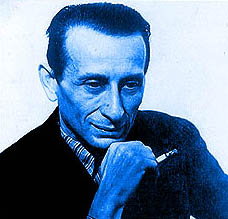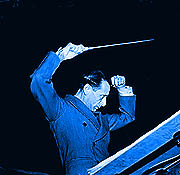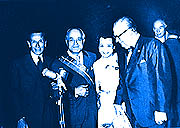 Alexander Tansman was born in Lodz on June 11th (not 12th) 1897. He studied in Lodz
and Warsaw under the guidance of professors Wojciech Gawroñski
(a student of Moszkowski and Brahms), Naum Podkaminer (a student of
Nikolay Rimsky-Korsakov), Karol Lüdschg and the Hungarian Sandor Va`s.
He was taught harmonics and counterpoint in Warsaw by Piotr Rytel, while
Henryk Melcer-Szczawiñski gave professional advice on his compositions.
Tansman's early compositions can be divided into two parallel currents,
the first of which was firmly embedded in Polish national tradition and
under the strong influence of Chopin.
The second current was avant-garde in character and went well beyond the
parochial tastes of contemporary Polish musical circles. As early as
1916 the young composer was writing atonal and polytonal music, while in
the Ist String Quartet he made use of dodecaphonic themes - his
achievement is all the greater if one takes into account the fact that
at the time he did not have the slightest idea that somewhere in the
world there lived a certain Arnold Schönberg. Even today, eighty years
later, his cycle of Eight Japanese Songs, which was composed to texts
written by Remigiusz Kwiatkowski, still sounds fresh and new.
In the first composer's competition held in Independent Poland, which
ended in Warsaw on January 8th 1919, he was awarded the first three
prizes.
Alexander Tansman was born in Lodz on June 11th (not 12th) 1897. He studied in Lodz
and Warsaw under the guidance of professors Wojciech Gawroñski
(a student of Moszkowski and Brahms), Naum Podkaminer (a student of
Nikolay Rimsky-Korsakov), Karol Lüdschg and the Hungarian Sandor Va`s.
He was taught harmonics and counterpoint in Warsaw by Piotr Rytel, while
Henryk Melcer-Szczawiñski gave professional advice on his compositions.
Tansman's early compositions can be divided into two parallel currents,
the first of which was firmly embedded in Polish national tradition and
under the strong influence of Chopin.
The second current was avant-garde in character and went well beyond the
parochial tastes of contemporary Polish musical circles. As early as
1916 the young composer was writing atonal and polytonal music, while in
the Ist String Quartet he made use of dodecaphonic themes - his
achievement is all the greater if one takes into account the fact that
at the time he did not have the slightest idea that somewhere in the
world there lived a certain Arnold Schönberg. Even today, eighty years
later, his cycle of Eight Japanese Songs, which was composed to texts
written by Remigiusz Kwiatkowski, still sounds fresh and new.
In the first composer's competition held in Independent Poland, which
ended in Warsaw on January 8th 1919, he was awarded the first three
prizes.
 In Poland, however, his compositions met with the same vitriolic
criticism - coming from Warsaw circles - that had been directed
against Karol Szymanowski. As a result, Tansman decided to leave for
France. In Paris he presented his compositions to Maurice Ravel and
received his wholehearted approval. Thereafter, Aleksander Tansman's
international career progressed at an all but sensational pace.
Arthur Honegger and Darius Milhaud induced him to join their Group "Le
Six" as the "seventh", but he prized his independence above all else.
Soon after his name began to be mentioned in connection with the
composers of the "L'Ecole de Paris" - Bohuslav Martinu,Tibor Harsanyi,
Marcel Mihalovici and Aleksandr Cherepnin.
By the beginning of the twenties Tansman was, alongside Karol
Szymanowski, the foremost representative of the "new school of
composers" in Poland.
In Poland, however, his compositions met with the same vitriolic
criticism - coming from Warsaw circles - that had been directed
against Karol Szymanowski. As a result, Tansman decided to leave for
France. In Paris he presented his compositions to Maurice Ravel and
received his wholehearted approval. Thereafter, Aleksander Tansman's
international career progressed at an all but sensational pace.
Arthur Honegger and Darius Milhaud induced him to join their Group "Le
Six" as the "seventh", but he prized his independence above all else.
Soon after his name began to be mentioned in connection with the
composers of the "L'Ecole de Paris" - Bohuslav Martinu,Tibor Harsanyi,
Marcel Mihalovici and Aleksandr Cherepnin.
By the beginning of the twenties Tansman was, alongside Karol
Szymanowski, the foremost representative of the "new school of
composers" in Poland.
 Tansman's rise to fame was meteoric. In America his pieces were
conducted by Sergey Kussevitzky, Tulio Serafin, Arturo Toscanini,
Leopold Stokowski, Willem Mengelberg, while in Europe by Pierre Monteux,
Jasha Horenstein, Herman Abendroth, Walter Straram, Erich Kleiber, Otto
Klemperer, Emil M³ynarski and Grzegorz Fitelberg. His chamber pieces
were played by the most famous string quartets, while his solo
compositions were performed by pianists such as Walter Gieseking, José
Iturbi, Henri Gil-Marchex, Jan Smeterlin, Henryk Sztompka, Mieczys³aw
Horszowski and Zbigniew Drzewiecki.
They were sung by Maria Freund, Jane Bathori and Stanis³awa Korwin-Szymanowska, and also became the show pieces of violinists Bronis³aw Huberman, József Szigeti, Hélène
Jourdan-Morhange and Irena Dubiska, and of violoncellists Pablo Casals,
Gregory Piatigorsky, Maurice Maréchal, Enrico Mainardi and Kazimierz
Wi³komirski. He was a close friend of Chaplin and Gershwin.
Tansman's rise to fame was meteoric. In America his pieces were
conducted by Sergey Kussevitzky, Tulio Serafin, Arturo Toscanini,
Leopold Stokowski, Willem Mengelberg, while in Europe by Pierre Monteux,
Jasha Horenstein, Herman Abendroth, Walter Straram, Erich Kleiber, Otto
Klemperer, Emil M³ynarski and Grzegorz Fitelberg. His chamber pieces
were played by the most famous string quartets, while his solo
compositions were performed by pianists such as Walter Gieseking, José
Iturbi, Henri Gil-Marchex, Jan Smeterlin, Henryk Sztompka, Mieczys³aw
Horszowski and Zbigniew Drzewiecki.
They were sung by Maria Freund, Jane Bathori and Stanis³awa Korwin-Szymanowska, and also became the show pieces of violinists Bronis³aw Huberman, József Szigeti, Hélène
Jourdan-Morhange and Irena Dubiska, and of violoncellists Pablo Casals,
Gregory Piatigorsky, Maurice Maréchal, Enrico Mainardi and Kazimierz
Wi³komirski. He was a close friend of Chaplin and Gershwin.
 A monograph dedicated to Tansman, entitled Aleksander Tansman - Polish
Composer and written by Irving Schwerke, the famous American critic, was
published in 1931 in both Paris and New York. Its hero was just 34 years
old! The 1932-33 season, during which Tansman embarked on a round-the-world concert tour that started in Warsaw and took him across
the United States, Japan, China, Hong Kong, the Philippines, Singapore,
Indonesia, the Malay archipelago and Ceylon to Egypt, marked an
important stage in his career.
In Tokyo he was received by Emperor
Hirohito, while in Bombay he was the private guest of Mahatma Gandhi.
Everywhere he travelled, he was greeted as one of the greatest Polish
artists of the time.
A monograph dedicated to Tansman, entitled Aleksander Tansman - Polish
Composer and written by Irving Schwerke, the famous American critic, was
published in 1931 in both Paris and New York. Its hero was just 34 years
old! The 1932-33 season, during which Tansman embarked on a round-the-world concert tour that started in Warsaw and took him across
the United States, Japan, China, Hong Kong, the Philippines, Singapore,
Indonesia, the Malay archipelago and Ceylon to Egypt, marked an
important stage in his career.
In Tokyo he was received by Emperor
Hirohito, while in Bombay he was the private guest of Mahatma Gandhi.
Everywhere he travelled, he was greeted as one of the greatest Polish
artists of the time.
 In 1939 Tansman went on five great concert tours of the United States,
and soon became a well known composer in that country. He spent the war
years in Hollywood, which then played the role of American "Weimar".
Tansman shared the fate of many European émigrés - like that of Arnold
Schönberg, Igor Stravinsky, Darius Milhaud, Béla Bartók, and of writers
Thomas Mann, Lion Feuchtwanger and Emil Ludwig. His friendship with
Stravinsky was to result in a biographical book - one of the most
valuable and credible works for those who wish to acquaint themselves
with the brilliant composer's artistry and creative achievement.
In 1939 Tansman went on five great concert tours of the United States,
and soon became a well known composer in that country. He spent the war
years in Hollywood, which then played the role of American "Weimar".
Tansman shared the fate of many European émigrés - like that of Arnold
Schönberg, Igor Stravinsky, Darius Milhaud, Béla Bartók, and of writers
Thomas Mann, Lion Feuchtwanger and Emil Ludwig. His friendship with
Stravinsky was to result in a biographical book - one of the most
valuable and credible works for those who wish to acquaint themselves
with the brilliant composer's artistry and creative achievement.
 In 1946 he returned to Europe and once again settled in Paris.
The time of his creative maturity was nearing. His compositions became part of
the fixed concert hall repertoire. Tansman became a classic in both
meanings of the word: literal and figurative. He was included amongst
the most famous representatives of the neo-classical current in world
music, alongside Stravinsky, Hindemith, Poulenc and Casella. His
outstanding contribution to world music was officially confirmed by many
awards and distinctions, the Japanese Ji-ji Shimpo Medal, honorary
membership of the Imperial Musical Academy in Tokyo, the Elizabeth
Sprague-Coolidge Medal in Washington, the Musical Award of the French
Academy, the Prix Hector Berlioz in Paris, a chair in the Royal Belgian
Academy, which he inherited from Dmitry Shostakovich, the Commandery of
the French Order of Arts and Sciences, and the honorary membership Medal
of the Association of Polish Composers.
In 1946 he returned to Europe and once again settled in Paris.
The time of his creative maturity was nearing. His compositions became part of
the fixed concert hall repertoire. Tansman became a classic in both
meanings of the word: literal and figurative. He was included amongst
the most famous representatives of the neo-classical current in world
music, alongside Stravinsky, Hindemith, Poulenc and Casella. His
outstanding contribution to world music was officially confirmed by many
awards and distinctions, the Japanese Ji-ji Shimpo Medal, honorary
membership of the Imperial Musical Academy in Tokyo, the Elizabeth
Sprague-Coolidge Medal in Washington, the Musical Award of the French
Academy, the Prix Hector Berlioz in Paris, a chair in the Royal Belgian
Academy, which he inherited from Dmitry Shostakovich, the Commandery of
the French Order of Arts and Sciences, and the honorary membership Medal
of the Association of Polish Composers.
 In 1983 this list was supplemented by two Polish distinctions: the Gold
Decoration of the Order of Merit and the Decoration of Merit for Polish
Culture. In 1986 the Academy of Music in Lodz granted him a honoris
causa doctorate.
In a letter to Polish readers, written in June 1983, the composer
stated: "It is obvious that I owe much to France, but anyone who has
ever heard my compositions cannot have doubt that I have been, am and
forever will be a Polish composer".
Tansman's last piece, composed shortly before his death, in 1985, was
a miniature composition for viola and piano entitled... Alla polacca.
In 1983 this list was supplemented by two Polish distinctions: the Gold
Decoration of the Order of Merit and the Decoration of Merit for Polish
Culture. In 1986 the Academy of Music in Lodz granted him a honoris
causa doctorate.
In a letter to Polish readers, written in June 1983, the composer
stated: "It is obvious that I owe much to France, but anyone who has
ever heard my compositions cannot have doubt that I have been, am and
forever will be a Polish composer".
Tansman's last piece, composed shortly before his death, in 1985, was
a miniature composition for viola and piano entitled... Alla polacca.
The composer died in Paris on November 15th 1986.
Janusz Cegie³³a
 |
 |
 |